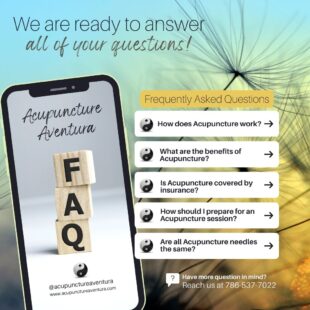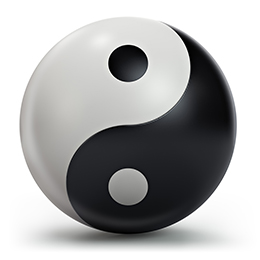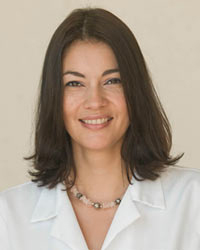Acupuncture FAQ
Acupuncture Frequently Asked Questions – here are the twenty most frequently asked questions about acupuncture, along with their in-depth answers. If you have a question not covered on this page, please reach out to us at 786-537-7022 and we will be happy to provide answers for any of your questions.
1. What is acupuncture and how does it work?
Answer: Acupuncture is a therapeutic method originating from traditional Chinese medicine. It involves the insertion of thin, sterile needles into specific points on the body, called acupuncture points. The underlying principle suggests that the body has an energy force running throughout called “qi” (pronounced “chee”). Disruptions in the flow of qi can lead to illness. By accessing these points, acupuncture aims to restore the balance and flow of qi, promoting health and healing. Modern research also suggests that acupuncture can stimulate blood flow, release endorphins, lessen inflammation, and activate the body’s natural painkillers.
2. Is acupuncture painful?
Answer: Acupuncture needles are very fine, much thinner than needles used for injections. Most patients describe the sensation as a very slight pinch or a tingling feeling rather than pain. Once the needles are in place, they often report feeling relaxed and after treatment, energized.
3. What are the benefits of acupuncture?
Answer: Acupuncture offers a wide range of benefits. It can provide pain relief, reduce inflammation, improve blood flow, stimulate the immune system, reduce stress and anxiety, elevate mood, improve sleep, regulate hormones and help in the management of chronic conditions. It’s also often used in conjunction with other treatments as part of a comprehensive approach to wellness.
4. Are there any side effects to acupuncture?
Answer: Acupuncture is generally considered safe when administered by a licensed practitioner. Side effects are very rare but can include slight bruising, slight bleeding at the needle site, or dizziness. Again, these effects happen very infrequently. Any discomfort usually resolves quickly.
5. How many acupuncture treatments will I need?
Answer: The number of treatments varies based on individual needs. Acute issues might see improvement in a few sessions, while chronic conditions may require more extended treatment. But do not be surprised if you feel immediate benefits from your first acupuncture session. Many do! Your acupuncturist will assess your specific situation and recommend an appropriate treatment plan.
6. What conditions can acupuncture treat effectively?
Answer: Acupuncture has been found effective for a wide range of conditions, from pain management to digestive issues to mental health concerns to fertility issues. The World Health Organization recognizes its efficacy for over 40 common disorders. However, it’s essential to consult with a licensed acupuncturist to determine its appropriateness for your specific condition. Please give us a call at 786-537-7022 to determine if treatment is appropriate for you.
7. What should I expect during my first acupuncture session?
Answer: During your initial visit, your acupuncturist will take a detailed health history, perform an examination, and discuss your health concerns. The treatment involves lying comfortably while the needles are inserted. The needles typically remain in place for 25-30 minutes. Many find the experience deeply relaxing and satisfying.
8. Can I combine acupuncture with my current medications or treatments?
Answer: Yes, acupuncture can be an excellent complement to many conventional treatments. However, it’s crucial to inform your acupuncturist of any medications or therapies you’re currently undergoing, so they can tailor the treatment accordingly.
9. How should I prepare for an acupuncture session?
Answer: Wear loose, comfortable clothing. It’s recommended not to come on an empty stomach or right after a heavy meal. Avoid caffeine or strong stimulants a few hours before the session. Arriving calm and relaxed can enhance the experience.
10. Is acupuncture only based on ancient beliefs, or is there modern scientific support?
Answer: While acupuncture has roots in ancient Chinese medicine, numerous modern studies have documented its efficacy. Research has explored its impact on the nervous system, endorphins, and other physiological processes. As understanding grows, more medical professionals are recognizing acupuncture as a valuable component of comprehensive healthcare. There are many research studies available on PubMed and other reputable clinical research sites.
11. Are all acupuncture needles the same?
Answer: No. Acupuncture needles can vary in length, width, and shape, but they are universally thin, sterile and flexible. The choice of needle often depends on the specific treatment area, depth of insertion, and the acupuncturist’s preferred technique.
12. Can children receive acupuncture?
Answer: Yes, children can benefit from acupuncture. Pediatric acupuncture has been used to treat conditions like colic, ADHD, and asthma. It’s essential, however, to find an acupuncturist experienced in treating children, as their approach might differ from treating adults.
13. How do I choose a reputable acupuncturist?
Answer: Seek out a Licensed Acupuncturist (L.Ac) who has undergone rigorous training and passed national board exams. Both acupuncturists at our clinic are nationally board certified by the NCCAOM and licensed by the state of Florida to practice acupuncture. It’s also a good idea to ask for recommendations, read reviews, and even schedule a consultation to assess compatibility and comfort.
14. Can acupuncture help with mental health issues like anxiety and depression?
Answer: Yes, acupuncture has been shown to help manage symptoms of anxiety, depression, and other mental health disorders. It can stimulate the release of neurotransmitters and promote a state of deep relaxation, providing a natural approach to mental well-being.
15. Is acupuncture covered by insurance?
Answer: Insurance Coverage varies by provider and plan. While more insurance companies are recognizing the benefits of acupuncture and providing coverage, it’s essential to check with your specific insurer to determine the extent of the benefits. Currently, we have been able to obtain reimbursement from Aetna, Cigna, United Health, Humana, Blue Cross Blue Shield, and others. Give us a call at 786-537-7022 and we can verify your coverage.
16. What is the difference between acupuncture and dry needling?
Answer: While both acupuncture and dry needling use thin needles, their methodologies and objectives differ. Acupuncture is based on traditional Chinese medicine principles, aiming to balance the body’s energy flow. Dry needling targets muscular trigger points to relieve pain and improve function and is rooted in Western anatomical and neurophysiological principles. Both acupuncture and Dry Needling is available at our Aventura clinic.
17. How is acupressure different from acupuncture?
Answer: Acupressure involves applying manual pressure to acupuncture points, while acupuncture uses needles. Both aim to stimulate specific points to alleviate symptoms and balance energy, but acupressure is needle-free.
18. Is there a best time of day to receive acupuncture?
Answer: While there’s no universally “best” time for everyone, many people find that acupuncture helps them relax, making evening appointments ideal. Others might find it energizing and prefer morning sessions. It largely depends on personal preferences and the specific conditions being treated.
19. Do I need to believe in acupuncture for it to work?
Answer: No, acupuncture doesn’t require belief to be effective. While a positive mindset can enhance any therapeutic experience, many skeptics have benefited from acupuncture treatments. The physiological effects occur regardless of one’s beliefs. In fact, veterinary acupuncture is extremely popular due to its efficacy with animals including dogs, cats and horses. Animals do not believe or disbelieve in the efficacy of the treatment they are receiving.
20. Is there any condition for which acupuncture is contraindicated?
Answer: While acupuncture is safe for most people, certain conditions might require caution. For example, those with bleeding disorders or taking blood thinners should inform their acupuncturist to adjust needle depth or technique. It’s crucial to discuss all health concerns with your acupuncturist before treatment.
Don’t see your question here? Give us a call at 786-537-7022 and we will gladly answer all questions!





